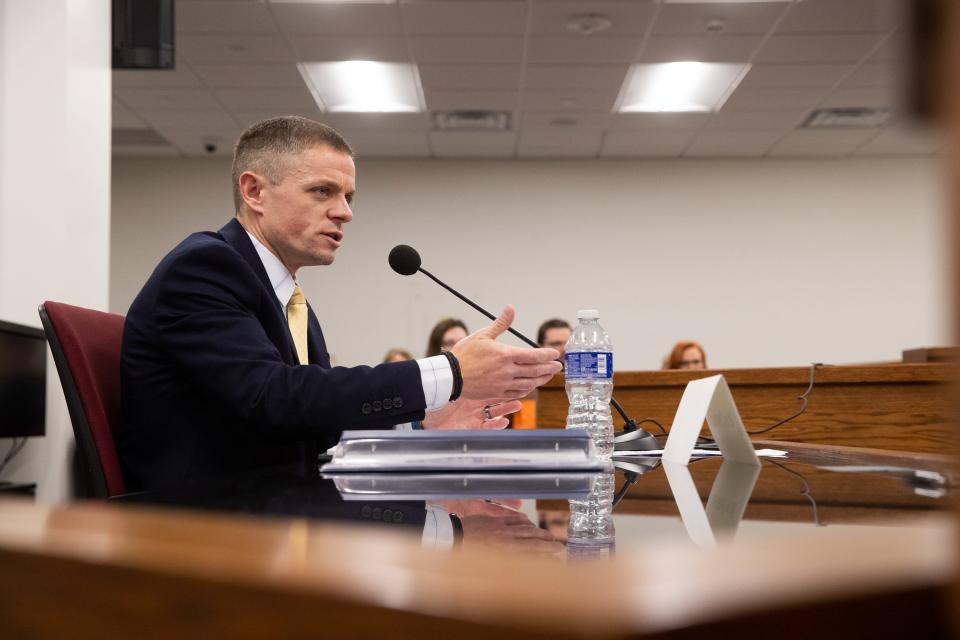Arizona prisons chief sounds $252M alarm on Republican-backed immigration ballot measure
- Oops!Something went wrong.Please try again later.
Corrections & Clarifications: A previous version of this article had an incorrect subheadline. The subheadline should have read: Is an asylum claim a shield?
It could cost the state's prison system nearly $252 million over five years to incarcerate adults under the terms of a proposed law that has reignited debate over Arizona's ability to control its border with Mexico.
The proposal, which state senators are expected to vote on Tuesday, would require the Arizona Department of Corrections, Rehabilitation and Reentry to house anyone arrested for entering Arizona illegally, whether convicted or not. That's one of many provisions of House Concurrent Resolution 2060, which GOP lawmakers want to place on the November ballot.
Agency Director Ryan Thornell estimates the measure could add 1,500 people yearly to the state's already strained prison system, with no option to turn them away.
"It reads as though the counties have somewhat of an option, if they have capacity or not," Thornell said Monday of the resolution. "Then, we become the requirement. If a county jail indicates they can't take somebody, the new amendment indicates the director and the department 'shall'."
The obligation would not only add millions to the state's prison spending, but it risks running afoul of a federal court injunction related to the state's handling of inmate medical care, Thornell said. The state is bound to honor certain health care and "conditions of confinement" requirements, which add up to more staff and operational costs, he said.
The potential added cost comes as the agency is seeking an extra $74 million this year and a roughly $203 million increase in the budget for the fiscal year that starts July 1. Arizona faces a $1.3 billion deficit, split almost evenly between the current year and the coming budget year.

GOP: Act would deter illegal crossings
Senate President Warren Petersen, R-Gilbert, dismissed the figures as a scare tactic from Democratic Gov. Katie Hobbs' administration. Hobbs opposes the measure, which is a reconfigured revival of a bill she vetoed earlier this year. By putting the border mandates in a ballot referral, lawmakers can work around the governor and take the issue straight to the voters.
"Illegal immigration costs the state $3 billion per year," Petersen said in a statement, repeating a figure cited in a congressional budget hearing last week.
That figure was from the Federation for American Immigration Reform, which lobbies to reduce immigration into the U.S. and return it to more "normal" levels. The report stated that Arizona last year absorbed 610,000 illegal entrants and their children, at a taxpayer cost of $3.2 billion.
Petersen, like his GOP colleagues, argues that giving the state control over its border will more than offset the cost of enforcing HC2060.
Asked where the state would house children who come into the state with their parents, he said the measure would deter families from crossing the border.
Thornell said his agency is limited by law to handling only adults. It's unclear where children would be detained.
Stand for Children, an advocacy group, said it is concerned about how children would be treated under the law, if passed. That's because of an existing law requiring juveniles to not be housed with adults.
"I don't see how we get around an implementation that separates kids from families and very likely puts youth in the juvenile system, which would be dangerous," Rebecca Gau, the group's executive director, said in a statement late Monday. "We're trying to keep kids from being system involved, especially through no fault of their own."
Is an asylum claim a shield?
Also unclear is the interplay of asylum claims with the proposed law, which does not say whether an immigrant claiming federal asylum would be shielded from state enforcement. The measure does say anyone who has been granted asylum can use that as a defense against being deported, or being imprisoned while awaiting deportation.
Petersen's office did not respond to a question about asylum claims.
Attorneys for the ACLU have argued an asylum claim would preempt the state's ability to incarcerate or deport anyone who came across the border.
Thornell said he couldn't comment on whether asylum claims would lessen the burden on prison beds and staffing.
"That's one for the attorneys," he said. “I certainly think that is one that will be brought up.”
For now, he based his estimated uptick of 1,500 inmates on data from the state Department of Public Safety and the governor's budget office.
More staff needed
"Unequivocally, all of Arizona's prisons will require more staff should this measure go into effect," Thornell wrote in a budget memo.
Although he said the agency has had "slight improvements" in staffing, hiring is not moving at a pace to sustain an injection of 1,500 new inmates, he said. The agency currently has a 10% staff vacancy.
The measure, over time, will also sap the agency's ability to provide beds for all inmates, the memo states. Currently, the agency has 8,000 empty beds, or an 18% vacancy rate. But there is no staffing to go along with those 8,000 beds, should they fill up.
The memo then paints a dire scenario, assuming the current rate of incarceration along with 1,500 new border crossers each year: The need for a new prison.
The memo said if the estimates of 1,500 people added to the prison system is accurate, the state would be out of "usable" prison beds, including those in private prisons, by 2027.
Thornell said under current conditions, it takes three to five years to erect a new prison.
Reach the reporter at maryjo.pitzl@arizonarepublic.com or at 602-228-7566 and follow her on Threads as well as on X, the platform formerly known as Twitter, @maryjpitzl.
This article originally appeared on Arizona Republic: Arizona's proposed border law could strain the prison system, chief says

